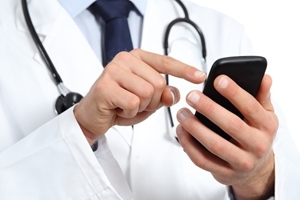Between Google's forthcoming contact lenses for diabetics and the first real-world bionic pancreas, technology continues to prove to be a powerful tool for both patients and medical staffing professionals. Now, new sensors for inhalers are being implemented to aid patients with chronic obstructive pulmonary disease.
The inhaler devices were developed by Propeller Health, a start-up company based in Madison, Wisconsin, which was founded by David Van Sickle, a former epidemiologist for the Centers for Disease Control and Prevention.
Roughly 200 Medicare patients who live in Phoenix will receive the sensors for their inhalers this year to track how often they use their medications. The goal: to identify patients at the earliest stage of an attack or exacerbation from COPD.
Those on travel nursing assignments may know that COPD is a progressive disease that makes it hard to breathe. COPD can trigger coughing that produces large amounts of mucus, chest tightness, wheezing, shortness of breath and other symptoms. The leading cause of COPD is cigarette smoking – most people who have COPD currently smoke or used to smoke, according to the National Heart, Lung and Blood Institute.
The sensor inhalers could help combat COPD. While monitoring medications, the sensors send the time and location to a smartphone. If a patient starts to use more medication or is actively using a rescue inhaler, alerts are sent to a doctor or caregiver, who can then intervene in the patient's care. Van Sickle explained that the system is unique in that it doesn't require direct patient involvement – the data is collected and transmitted automatically.
"The patient can forget the sensor is even there," Van Sickle told ModernHealthCare.com. "This platform is making it easier for people to manage these conditions on their own." He added that he hopes the technology will help lower patient readmission rates in hospitals.
Reducing remissions
In the grander scheme of things, medical staffing specialists may have noticed a shift in the last year of hospitals engaging with early-stage innovation more than before. Many health care facilities, which are focused on health and wellness products, are simply looking for new solutions – and technology is likely the driving force behind that solution.
A bunch of mobile apps address readmissions by digitizing medication adherence instructions, discharge instructions and appointment reminders. As part of this process, hospitals may find benefits with devices that measure and track vital signs at home, which they see as a better method of preventing readmissions.
In addition, healthcare staffing professionals may be inclined to purchase a technology based on integrated workflow and convenience rather than functionality. Apps that combine both are clearly the ideal solution.
Even Covidien, a large manufacturer of surgical supplies, is teaming up with a medical device incubator called Edison National Medical to hunt for new types of technology or software that can be used to improve the way surgical patients are monitored at home after being discharged from the hospital.
"I would be shocked if mobile didn't play a role," Julie Wheelan, vice president of marketing and brand strategy for Edison National Medical, told ModernHealthCare.com. "It's one of the most logical things to do."
A good amount of travel nursing professionals consider certain smartphone apps as an extension of clinical ability. It's another tool for gathering information to help patients gain insight into their own health.
As the market becomes more saturated with apps and medical devices, those working travel nurse jobs will likely see a rise in patient-friendly technology, making a difference both at the hospital and at home.

